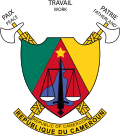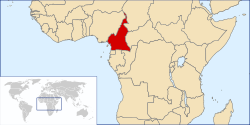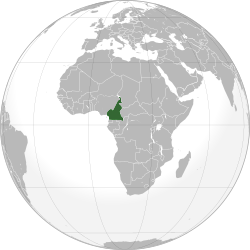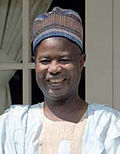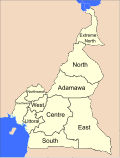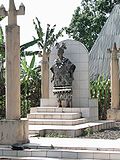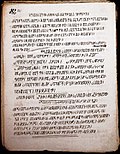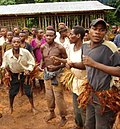Portal:Cameroon
The Cameroon Portal
Cameroon, officially the Republic of Cameroon, is a country in Central Africa. It shares boundaries with Nigeria to the west and north, Chad to the northeast, the Central African Republic to the east, and Equatorial Guinea, Gabon, and the Republic of the Congo to the south. Its coastline lies on the Bight of Biafra, part of the Gulf of Guinea, and the Atlantic Ocean. Due to its strategic position at the crossroads between West Africa and Central Africa, it has been categorized as being in both geostrategic locations. Cameroon's population of nearly 31 million people speak 250 native languages, in addition to the national tongues of English and French. The capital city of the country is Yaoundé. Cameroon became a German colony in 1884 known as Kamerun. After World War I, it was divided between France and the United Kingdom as League of Nations mandates until independence in 1960 and 1961 respectively. The Union of the Peoples of Cameroon (UPC) political party advocated independence but was outlawed by France in the 1950s, leading to a national liberation insurgency between French Armed Forces and the Union of the Peoples of Cameroon (UPC) until January 1971. In 1960, the French-administered part of Cameroon became independent, as the Republic of Cameroun, under President Ahmadou Ahidjo. The southern part of British Cameroons federated with it in 1961 to form the Federal Republic of Cameroon. The federation was abandoned in 1972. The country was renamed the United Republic of Cameroon in 1972 and back to the Republic of Cameroon in 1984 by a presidential decree by President Paul Biya. Biya, the incumbent president, has led the country since 1982 following Ahidjo's resignation; he previously held office as prime minister from 1975 onward. Cameroon is governed as a unitary presidential republic. The official languages of Cameroon are French and English. Christianity is the majority religion in Cameroon, with significant minorities practising Islam and traditional faiths. It has experienced tensions from the English-speaking territories, where politicians have advocated for greater decentralisation and even complete separation or independence (as in the Southern Cameroons National Council). In 2017, tensions over the creation of an Ambazonian state in the English-speaking territories escalated into open warfare. Large numbers of Cameroonians live as subsistence farmers. The country is often referred to as "Africa in miniature" for its geological, linguistic, and cultural diversity. Its natural features include beaches, deserts, mountains, rainforests, and savannas. Cameroon's highest point, at almost 4,100 metres (13,500 ft), is Mount Cameroon in the Southwest Region. (Full article...) Selected article -Lesbian, gay, bisexual, transgender and queer (LGBTQ) people in Cameroon face significant challenges not experienced by non-LGBTQ residents. Both male and female same-sex sexual activity is illegal in Cameroon and LGBTQ people face stigmatization and prevalent discrimination among the broader population. As of 2020, Cameroon "currently prosecutes consensual same sex conduct more aggressively than almost any country in the world". (Full article...) Did you know (auto-generated)
More did you know -General images -The following are images from various Cameroon-related articles on Wikipedia.
WikiProjectsTopicsCategoriesRelated portalsAssociated WikimediaThe following Wikimedia Foundation sister projects provide more on this subject:
Discover Wikipedia using portals | ||||


